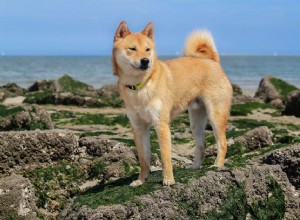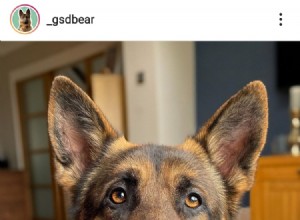
 Průvodce plemenem border kolie:Historie, temperament a tipy na péči
Průvodce plemenem border kolie:Historie, temperament a tipy na péči
 Průvodce plemenem labradorského retrívra:vlastnosti, historie a péče
Průvodce plemenem labradorského retrívra:vlastnosti, historie a péče
 Průvodce plemenem baseta:vlastnosti, historie a péče
Průvodce plemenem baseta:vlastnosti, historie a péče
 Průvodce plemenem Shih Tzu:Charakteristika, historie a péče
Průvodce plemenem Shih Tzu:Charakteristika, historie a péče
 Průvodce plemenem jezevčíka:Charakteristika, historie a péče
Průvodce plemenem jezevčíka:Charakteristika, historie a péče
 Průvodce plemenem amerického buldoka:Charakteristika, historie a péče
Průvodce plemenem amerického buldoka:Charakteristika, historie a péče
 Průvodce plemenem čivavy:vlastnosti, historie a péče
Průvodce plemenem čivavy:vlastnosti, historie a péče
 Průvodce plemenem anglického buldoka:Charakteristika, historie a péče
Průvodce plemenem anglického buldoka:Charakteristika, historie a péče
Se svými zářivými očima a plyšovou srstí jsou Shiba Inus oficiálním japonským národním pokladem. Tito krásní psi mohou být dobrými společníky, ale mohou být také nezávislí a tvrdohlaví.
Zajímá vás, zda je toto plemeno tou nejlepší volbou pro vás a vaši rodinu? Pokračujte ve čtení, abyste se dozvěděli více informací o temperamentu Shiba Inu, historii plemene, požadavcích na péči a další, které vám pomohou stát se nejlepšími možnými rodiči domácích mazlíčků.
Obsah
Tip pro profesionály: Pomozte zbavit se stresu z péče o vaše Shiba Inu tím, že je přihlásíte do pojištění domácích mazlíčků. Pojištění zvířat Shiba Inu je nejlepší způsob, jak se o svého psa postarat v každé fázi jeho života.
Shiba Inu je středně velké plemeno špic se špičatýma ušima, tmavýma očima a liščím vzhledem. Průměrná hmotnost psa Shiba Inu je asi23 liber u psů a 17 liber u fen. Průměrná výška mužů je mezi 14,5 a 16,5 palce a žen mezi 13,5 a 15,5 palce.
Členové tohoto plemene bývají dobře osvalení a mají hustou srst (podobně jako sibiřský husky), která se vyskytuje v několika barevných variacích:
Všechny shiby mají bílé znaky na hrudi, břiše, tvářích, nohách a vnitřních uších.
Typically, the temperament of a Shibu Inu is confident, bold, and good-natured , though they can be slightly stubborn and occasionally affectionate (on the off-chance they feel like it). In general, females tend to be shyer than males, especially around strangers. Male Shiba Inus are usually more active and friendlier with humans, but they can be wary or defensive around other dogs, especially males.
The American Temperament Test Society (ATTS) objectively evaluates dog breeds by their typical personalities based on scores in categories such as friendliness, protectiveness, reactivity, and more. According to the ATTS data, only 67.9% of Shiba Inus passed the test and were considered to be well-mannered dogs.
This breed is often known for dramatics. They may talk, yodel, scream, or even throw temper tantrums if they need attention or things don't go their way. Both genders have a reputation for being “cat-like” due to their grooming habits and strong independence.
That said, Shiba Inus can be good family dogs due to their loyal, affectionate, and devoted qualities, though their solitary breed history usually makes them best suited for single-pet households. They can do well with children as long as they’re properly trained and socialized , and the kids treat them kindly. Shiba Inu dogs also make good watchdogs as they are known for being fearless, alert, and selfless.
The average life expectancy of this breed is from 13 to 16 years, which is a good lifespan for a medium-sized dog. The oldest Shiba recorded in the Guinness Book of Records reached the age of 26.
In general, Shibas will stay healthy as long as their owners provide them with proper nutrition, exercise, and healthcare.

Shiba Inu dogs are very smart but also quite stubborn and independent. While they do understand when the owner wants them to stay or sit, they may only listen when they feel like it. The good news is these dogs are naturally obedient and very devoted . With some patience, consistency, and positive reinforcement, you should get the desired results.
Early training and socialization are a must in order for your Shiba to learn to have good manners. However, these dogs should never be off-lead unless in a confined area as they’re prone to escaping .
On the flip side, the members of this breed are very easy to housebreak . By five weeks, many Shiba puppies are able to last all night without going outside and can wait until morning to be taken outside to go to the bathroom.
Shiba Inus are fairly energetic and love walks . Owners should be dedicated to providing regular physical activity, especially if the dog doesn't have an adequate, safely-fenced yard.
An adult Shiba Inu is advised to eat around one to one and a half cups of kibble per day, depending on their energy levels and size.
Some members of this breed will eat anything in sight, so free feeding should be avoided. Some Shibas are prone to getting overweight so watch your dog's calorie intake and level of activity. A healthy Shiba is neither too thin nor too fat. You should be able to feel their backbone, hip bones, and ribs but not see them.
If you have any questions about the type, quantity, or frequency of feedings for your Shiba be sure to talk to your veterinarian. As pet nutrition experts, veterinarians can assess your Shiba’s ideal weight and work with you on a diet plan that will keep your pup happy and healthy throughout their life.
Although they are generally clean dogs , Shiba Inus do shed quite a lot, especially during molting season . Regular brushing or combing is required during periods of heavy shedding to reduce the amount of hair around the house and keep the coat in good condition.
If they are not used to bathing or grooming, Shibas might let out their infamous, high-pitched scream. If the grooming sessions are a struggle, consider taking your dog to a professional groomer.
One way to avoid struggles associated with grooming is to regularly expose your Shiba to these activities at a young age. Performing regular nail trims, brushing, bathing and grooming when your Shiba is still a puppy will make these activities more pleasant for them and for you as they grow into adults.
Shibas need a fenced-in yard with enough space to roam . Thanks to their hunting roots, these dogs have a high prey drive , which is why they should always be leashed outside the house.
Shiba Inus are known for wanting things done their way when it comes to affection, grooming, and routine and appreciate it if you stick to a certain schedule. Establishing routine and obedience training from a young age will ensure your Shiba is a respectful, healthy member of your family.
Shibas aren’t always in a playful mood or want to be petted , especially by strangers. They also like to mark their territory almost anywhere, both of which are important traits to consider when exercising your dog.
In general, these dogs are not prone to destruction if left alone, but some can suffer separation anxiety and are recommended to be crate trained as puppies so they have a safe, anxiety free space to spend time when left alone.

In general, Shiba Inus are a healthy breed but due to the early close-breeding of the gene pool after WWII, they are prone to certain inheritable health conditions, including:
Pet parents should keep an eye on any symptoms of these conditions and get in touch with a vet as soon as they notice anything out of the ordinary .
Pro Tip:Pet insurance is a great way to ensure the best care for your Shiba Inu without hurting your bank account. Finding the best pet insurance for your Shiba Inu involves research so you’ll get not only the most affordable plan but also the plan that meets your pet’s needs.
If you’re thinking about welcoming a Shiba dog into your family, the National Shiba Club of America is the best place to start your research. You could also reach out to rescue organizations like the NYC Shiba Rescue.
If you are interested in similar breeds, consider looking into Akitas, Chow Chows, and Japanese Spitz.

V tomto článku Charakteristiky Historie plemen Školení a péče Zdravotní problémy Dieta a výživa Kde přijmout nebo koupit Přehled plemene Další výzkum Shiba inu je malé, nesportovní psí plemeno z Japonska, které má krátkou, ale hustou dvojitou srst a celkově vzhled podobný lišce. Jeho uši jsou vzpř

Němečtí ovčáci, původně vyvinutí k pasení ovcí, se vyvinuli v mnohem víc než jen pracovní psi. Toto oblíbené plemeno je neúnavné, inteligentní a sportovní. Kromě svých běžných rolí ve veřejné službě jsou němečtí ovčáci často skvělými rodinnými psy, protože bývají mírní, společenští, hraví a chrání s